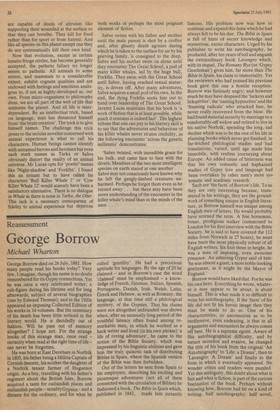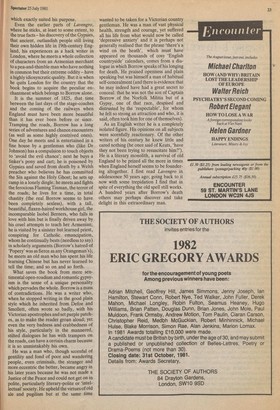Reassessment
George Borrow
Michael Wharton
George Borrow died on 26 July, 1881. How many people read his books today? Very few, I imagine, though his name is no doubt remembered for its Gypsy connections. Yet he was once a very celebrated writer; a cult-figure during his lifetime and for long afterwards; subject of several biographies (one by Edward Thomas); and in the 1920s appeared an imposing Collected Edition of his works in 14 volumes. But the centenary of his death has been little noticed in the literary world. He is decidedly out of fashion. Will he pass out of memory altogether? I hope not. For the strange books of this strange man, once read — certainly when read at the right time of life — can never be forgotten.
He was born at East Dereham in Norfolk in 1803, his father being a Militia Captain of Cornish descent, his mother the daughter of a Norfolk tenant farmer of Huguenot origin. As a boy, travelling with his father's regiment about the British Isles, Borrow acquired a taste for outlandish places and outlandish people — notably Gypsies and a distaste for the ordinary, and for what he called 'gentility'. He had a precocious aptitude for languages. By the age of 20 he claimed — and in Borrow's case the word 'claimed' must be emphasised — a knowledge of French, German, Italian, Spanish, Portuguese, Danish, Irish, Welsh, Latin, Greek and Hebrew, as well as Romany, the language, at that time still a philological mystery, of the Gypsies. That his claims were not altogether unfounded was shown when, after an unusually long period of the youthful latency often found among remarkable men, in which he worked as a hack writer and lived (in his own phrase) 'a life of roving adventure', he came to the notice of the Bible Society, which was impressed by his linguistic abilities and gave him the truly quixotic task of distributing Bibles in Spain, where the Spanish version of the Bible was then forbidden.
Out of the letters he sent from Spain to his employers, describing his exciting and picaresque adventures (not all of them connected with the circulation of Bibles) he fashioned a book, The Bible in Spain which, published in 1842, made him instantly famous. His problem now was how to continue and expand this fame which he had always felt to be his due. The Bible in Spain is full of hints of secret knowledge and mysterious, exotic characters. Urged by his publisher to write his autobiography, he produced, after ten years of toil and anguish the extraordinary book Lavengro which, with its sequel, The Romany Rye (or 'Gypsy Gentleman') gives him, far more than The Bible in Spain, his claim to immortality. Yet the reviewers who had praised his previous book gave this one a hostile reception. Borrow was furiously angry; and however much he may have despised the 'lackeys and lickspittles', the 'canting hypocrites' and the 'foaming radicals' who attacked him, he never really recovered from the blow. He had found material security by marriage to a comfortably-off widow and retired to live in his native Norfolk, spending the long, sad decline which was to be the rest of his life in planning books which never got finished, in far-fetched philological studies and bad translations, varied, until age made him immobile, with restless journeying about Europe. An added cause of bitterness was that his own romantic and haphazard studies of Gypsy lore and language had been overtaken by other men's more systematic and academic research.
Such are 'the facts' of Borrow's life. To us they are only interesting because, transmuted in his writings, they are the groundwork of something unique in English literature, as Borrow himself was unique among English men of letters. He would probably have scorned the term. A fine horseman, boxer, prodigious walker (summoned to London for his first interview with the Bible Society, he is said to have covered the 112 miles from Norwich in 27 hours), he must have been the most physically robust of all English writers. Six foot three in height, he was a man of imposing, even awesome presence. An admiring Gypsy said of him: 'he was almost a giant, a most noble-looking gentleman, as it might be the Mayor of England.'
Borrow would have liked that. For he was his own hero. Everything he wrote, whatever it may appear to be about, is about himself. This is what made it so difficult to write his autobiography. If the 'facts' of his life did not fit his heroic image then they must be made to do so. One of his characteristics, so unconscious as to be inoffensive, even endearing, is that in all arguments and encounters he always comes off best. He is a supreme egoist. Aware of this autobiographical difficulty, and by nature secretive and evasive, he changed the title of his book from the original 'An Autobiography' to 'Life: a Drama', then to lavengro: A Dream' and finally to the form in which it eventually appeared. No wonder critics and readers were puzzled. Yet this ambiguity, this doubt about what is fact and what is fiction, is part of the curious fascination of the book. Perhaps without knowing how, Borrow had hit on a kind of writing, half autobiography, half novel, which exactly suited his purpose.
Even the earlier parts of Lavengro, Where he sticks, at least to some extent, to the true facts — his discovery of the Gypsies, that ancient, outlandish people still living their own hidden life in 19th-century England, his experiences as a hack writer in London, where he meets a whole collection of characters from an Armenian merchant to a pea-and-thimble man who have nothing in common but their extreme oddity — have a highly idiosyncratic quality. But it is when he quits London for the country that the book begins to acquire the peculiar enchantment which belongs to Borrow alone.
It is the summer of 1825, that time between the last days of the stage-coaches and the coming of the railways when England must have been more beautiful than it has ever been before or since. Tramping the roads, Borrow has a long series of adventures and chance encounters (as well as some highly contrived ones). One day he meets and is entertained in a fine house by a gentleman who (like Dr Johnson) has a compulsion to touch objects to 'avoid the evil chance'; next he buys a tinker's pony and cart; he is poisoned by Gypsies and saved from death by a Welsh preacher who believes he has committed the Sin against the Holy Ghost; he sets up camp in a lonely dingle; he meets and fights the ferocious Flaming Tinman, the terror of the roads; he lives for a time, in total chastity (the real Borrow seems to have been completely sexless), with a tall, beautiful, flaxen-haired workhouse girl, the incomparable Isobel Berners, who falls in love with him but is finally driven away by his cruel attempts to teach her Armenian; he is visited by a sinister but learned priest, conspiring for Catholic emancipation, whom he continually bests (needless to say) in scholarly arguments (Borrow's hatred of 'Popery' was as fierce as any Orangeman's); he meets an old man who has spent his life learning Chinese but has never learned to tell the time; and so on and so forth.
What saves the book from mere sentimental open-roadism and romantic gypsyism is the sense of a unique personality which pervades the whole. Borrow is a mass of contradictions. He was a writer who, when he stopped writing in the good plain style which he inherited from Defoe and Smollett, often wrote so badly, with his Victorian apostrophes and set purple patches, as to make the reader groan aloud; yet even the very badness and crabbedness of his style, particularly in the mannered, stilted dialogues he has with trampers on the roads, can have a certain charm because it is so unmistakably his own.
He was a man who, though scornful of gentility and fond of poor and wandering people, even criminals, the stranger and more eccentric the better, became angry in his later years because he was not made a Justice of the Peace and could not get on in polite, particularly literary-polite or 'intellectual' society. He upheld the virtues of old ale and pugilism but at the same time wanted to be taken for a Victorian country gentleman. He was a man of vast physical health, strength and courage, yet suffered all his life from what would now be called 'depressive anxiety' and it is perhaps not generally realised that the phrase 'there's a wind on the heath', which must have appeared on thousands of cosy 'English countryside' calendars, comes from a dialogue in which Borrow speaks of his longing for death. He praised openness and plain speaking but was himself a man of habitual self-concealment (and there is evidence that he may indeed have had a great secret to conceal: that he was not the son of Captain Borrow of the Norfolk Militia but of a Gypsy, one of that race, despised and distrusted by the 'respectable', for whom he felt so strong an attraction and who, it is said, often took him for one of themselves).
As an English writer he is a completely isolated figure. His opinions on all subjects were scornfully reactionary. Of the other writers of his century he knew little and cared nothing (he once said of Keats, 'have they not been trying to resuscitate him?'). He is a literary monolith, a survival of old England to be prized all the more in times when England herself seems to be foundering altogether. I first read Lavengro in adolescence 50 years ago; going back to it now with some trepidation I find that in spite of everything the old spell still works. A hundred years after Borrow's death others may perhaps discover and take delight in this extraordinary man.



































 Previous page
Previous page